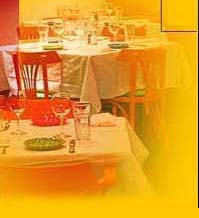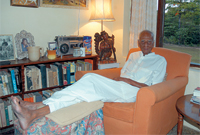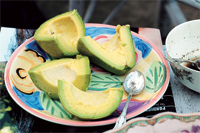


|
Writer In Residence
The famous author and novelist MANOHAR MALGONKAR, who is 93, spends his days in splendid isolation in an old stone-and-wood cottage in the heart of a jungle off the Goa-Belgaum Highway. He does not write much anymore but is pleased to play host to old friends and fans who call on him for a gimlet and lunch. UpperCrust�s MARK MANUEL and FARZANA CONTRACTOR had a long talk with the reclusive writer over tea one summer evening in his wooded lair. |
Malgonkar was sitting out in the garden. He now rose courteously in white kurta-pajama to greet us, all 6 feet 1 inch of him, the 93-year-old back propped ramrod straight by a walking stick out of military habit. I was seeing him after 12 years. And the years had not been too kind with Malgonkar. The body showed the wear and tear of his age. But the mind was all there. Now his small army of servants sprang to attention to receive us. And Malgonkar, aware that it was well past tea-time, asked, �What will you have? Some wine? Or a drink? This house is famous for its gimlets, but mind you, that is before lunch.� Farzana and I settled for tea. Meher Heroyce Moos, who was the third member of our party, asked for coconut water. The cottage has its own coconut plantation. Fifty years ago, when he resigned from the Indian Army as a lieutenant-colonel, Malgonkar moved in here to take up a career as a writer. His family had lived in the Jagalbet village for 200 years. And they owned a lot of property in the jungle. Though he only took up seven acres to build Burbusa. �I was mad, I grew coconuts, oranges, mangoes, cashew fruit, jackfruit, chickoos, coconuts, the best avocados in the world, plus I put in a lot of flowering trees. Then when my wife died some years ago, I stopped taking interest. The trees still give us fruits, but not to sell, there�s just enough for us to eat,� Malgonkar told me as we settled down to tea in the shadow of the house and beneath the trees.
But I was there to do an interview of the nonagenarian writer�s eating and drinking habits. I put this before him and he sighed wistfully. �At my age I have to be careful what I eat and drink,� he said. �I keep a lot of wine at home, because I entertain a lot, and I like to have half a glass of red before lunch. At night, I enjoy a small whisky and soda before dinner. I�m not very familiar with wines. Though I know what a good wine is. I also keep champagne at home. Not for myself. But my publishers from London come calling. Sometimes friends from the US. This house used to have big parties. Not I just entertain friends. I eat a little. Mainly soups, ice-cream, the avocados that I grow here with a home-made vinaigrette.� His eating habits, I discovered by raiding Burbusa�s kitchen and bumping into Narayan Gawde his cook of 45 years, are European. Porridge, stew and coffee for breakfast. Soup for lunch. Tea with biscuits at 4.30 in the afternoon. An early dinner of boiled potatoes, again a soup and egg. His staff, which included Chandrakant Gawde the houseboy, Sushila Jambudkar the housekeeper, Madhu Naik the driver, Ashok Kapolkar the waiter, and Rajesh Kapolkar the gardener, told me that Malgonkar hadn�t stepped out of his cottage in the Jagalbet jungle for at least 10 years. I could believe that. He got all his provisions and supplies from Jagalbet and Belgaum. And friends called to stay with him often. There was Mario Miranda from Goa. And a Col. Kerkar from Pune. But Col. Kerkar had passed away just a fortnight ago. And Mario Miranda, on whom Malgonkar is writing a 10,000 word foreword for a book on the celebrated artist, had visited just a week ago. So it was likely there were not going to be many callers after us, I though sadly as I made my way around the house.
I asked him, at his age, what he looked forward most to in life now. �Being at home,� Malgonkar said without hesitation. �It is wonderful here in the monsoon, the rains are rather heavy, but I like it. The weather is nice. Winter is delightful. It gets nice and cold. I light a woodfire and sit in front of it.� It was past sunset now and the servants were going about shutting the doors and windows to keep the fireflies from entering. We got up to leave. And Manohar Malgonkar courteously came tap-tapping to the front door to see us off. �Whenever you�re passing by next come and see if I�m still around,� he said as our car moved slowly out of Burbusa�s driveway, �Come have a meal with me.� I turned to wave and saw next to a chimney on the roof that was not smoking that evening, a dish antenna that brought the world into the old writer�s house.
|

Home Page
 THE sun was already setting on Burbusa, Manohar MaLgonkar�s picturesque cottage, when we drove into the courtyard one summer evening about his cocktail hour. The ageing author had invited us for tea. But getting to his residence in the jungle of Jagalbet, which is somewhere along the highway between Goa and Belgaum, proved to be too much of a challenge for our driver. We lost our way. And we got there two hours late. Farzana Contractor, who had photographs to shoot, frowned at the dappled sunlight as we parked our car among the trees and she reached for her camera bag.
THE sun was already setting on Burbusa, Manohar MaLgonkar�s picturesque cottage, when we drove into the courtyard one summer evening about his cocktail hour. The ageing author had invited us for tea. But getting to his residence in the jungle of Jagalbet, which is somewhere along the highway between Goa and Belgaum, proved to be too much of a challenge for our driver. We lost our way. And we got there two hours late. Farzana Contractor, who had photographs to shoot, frowned at the dappled sunlight as we parked our car among the trees and she reached for her camera bag.
 He did not like army life because he found it too constrictive. �Perhaps, if I continued, I might have retired as a general and now be staying in some cantonment,� Malgonkar said. �But I wanted to write.� And write he did, trying his hand out at everything, from short stories to several hugely successful novels. �My book The Princes was picked up by the Literary Guild. You know there are these two clubs in the US, the Literary Guild and the Book Of the Month Club, and if they take your book � you�re made! You have a guaranteed sale of at least a quarter million copies. The criteria for any writer having arrived in the US is the acceptance of his book by these clubs. The Princes made me a lot of money,� he said. His books are still making money, now in Euros, which is most welcome by him. Even those he wrote 35 years ago. And they are translated in several languages from French to Spanish and German to Romanian. His servant produced one in French, Le Vent du Diable, for my perusal. Unable to read it, I put it aside and picked up an old hardcover version of Malgonkar�s Bandicoot Run. On the inside jacket was written: �Manohar MaLgonkar�s novels bear the imprint of his own experience in the army and his masterly handling combines fact and fiction in a most superb blend.� This was credited to the Times Literary Supplement of London. Which knows the literature it is talking about.
He did not like army life because he found it too constrictive. �Perhaps, if I continued, I might have retired as a general and now be staying in some cantonment,� Malgonkar said. �But I wanted to write.� And write he did, trying his hand out at everything, from short stories to several hugely successful novels. �My book The Princes was picked up by the Literary Guild. You know there are these two clubs in the US, the Literary Guild and the Book Of the Month Club, and if they take your book � you�re made! You have a guaranteed sale of at least a quarter million copies. The criteria for any writer having arrived in the US is the acceptance of his book by these clubs. The Princes made me a lot of money,� he said. His books are still making money, now in Euros, which is most welcome by him. Even those he wrote 35 years ago. And they are translated in several languages from French to Spanish and German to Romanian. His servant produced one in French, Le Vent du Diable, for my perusal. Unable to read it, I put it aside and picked up an old hardcover version of Malgonkar�s Bandicoot Run. On the inside jacket was written: �Manohar MaLgonkar�s novels bear the imprint of his own experience in the army and his masterly handling combines fact and fiction in a most superb blend.� This was credited to the Times Literary Supplement of London. Which knows the literature it is talking about.
 It is a house that is meant for visitors to come and stay over the weekend. And, perhaps, for children to run around in and play hide-and-seek. Though I wondered if Malgonkar would like that at all. It is a house with character. With a fireplace in the hall that he lights up in the winter. And large comfortable chairs. There are sculptures everywhere and tablelamps that cast soft orange glows. Candlesticks stood in corners. And swords, old muskets, hung on the walls. There are paintings everywhere, of Malgonkar, his wife and daughter, both of whom have passed away, and in a small room just large enough to take it, a big tiger skin lay spread out on the floor. Malgonkar was a professional game-hunter and in his time, has shot eight tigers. This was one of them. I peeped into his bedroom where a Worldspace Radio stood beside his bed. And music CDs of Pandit Bhimsen Joshi and Pandit Hariprasad Chaurasia. But it was his study, or his den, that thrilled me the most. A warm and cosy room overlooking the garden, lined by bookshelves, and paintings of battle scenes. His Olympia typewriter sat squat and ready on his desk, as if waiting for the master�s touch, and by it The Wordsworth Wordmaster Dictionary. But the writer in residence does not write so much anymore. He has also stopped reading. And doing the crossword puzzles. Now he watches BBC on television. �Spending my days is my main business now. Din guzar rahe hain,� he laughed, making light of the sunset in his life.
It is a house that is meant for visitors to come and stay over the weekend. And, perhaps, for children to run around in and play hide-and-seek. Though I wondered if Malgonkar would like that at all. It is a house with character. With a fireplace in the hall that he lights up in the winter. And large comfortable chairs. There are sculptures everywhere and tablelamps that cast soft orange glows. Candlesticks stood in corners. And swords, old muskets, hung on the walls. There are paintings everywhere, of Malgonkar, his wife and daughter, both of whom have passed away, and in a small room just large enough to take it, a big tiger skin lay spread out on the floor. Malgonkar was a professional game-hunter and in his time, has shot eight tigers. This was one of them. I peeped into his bedroom where a Worldspace Radio stood beside his bed. And music CDs of Pandit Bhimsen Joshi and Pandit Hariprasad Chaurasia. But it was his study, or his den, that thrilled me the most. A warm and cosy room overlooking the garden, lined by bookshelves, and paintings of battle scenes. His Olympia typewriter sat squat and ready on his desk, as if waiting for the master�s touch, and by it The Wordsworth Wordmaster Dictionary. But the writer in residence does not write so much anymore. He has also stopped reading. And doing the crossword puzzles. Now he watches BBC on television. �Spending my days is my main business now. Din guzar rahe hain,� he laughed, making light of the sunset in his life.